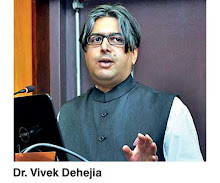In light of these, the Congress' victory, strengthening the mandate that they earned in 2004, is striking and surprising, and indeed impressive. It is true that the principal opposition party, the BJP, has suffered its share of infighting, and has been in something of a state of disarray in its leadership. But what seems to have resonated most with voters, based on people I've spoken to on the scene, is that the Congress was seen as a safe choice in difficult times. As India deals with the aftermath of the horrific terrorist attack in Mumbai last year, the possible spillover into India of the unfolding events in neighbouring Pakistan, and the aftermath of the global financial crisis, returning the Congress to power was a vote for the status quo. Voters also evidently gave the Congress high marks for finalizing the Indo-US nuclear cooperation deal, and pushing it through the Lok Sabha, despite opposition from the Left parties (who had their worst electoral results in years and will be a non-factor in the new scheme of things).
In terms of individual winners and losers, the election victory validates the alliance of Sonia Gandhi, the head of the Congress Party, and Manmohan Singh, the Prime Minister. They have a clear division of labour: Mrs. Gandhi runs the party, and Dr. Singh runs the government, largely keeping out of the political fray, and maintaining a squeaky clean image. Another clear winner is Jairam Ramesh, who had quit the Union Council of Ministers to run the election campaign as the party's chief strategist. It will be a major suprise if he doesn't receive a major Cabinet post. A new star on the scene is Shashi Tharoor, the former Under-Secretary General of the United Nations. Bitterly disappointed at being passed over for the top job, he has now catapulted himself into Indian politics in a major way, with a landslide victory in his constituency in Kerala. (In India, all numbers are large, and a landslide is a winning margin of about 100,000 votes!) Watch for him, too, to have an important portfolio in the new Cabinet.
In the midst of this overall good news for the Congress, several key ministers in the previous government went down to defeat. Most noteworthy is Mani Shankar Aiyar. Long the conscience of his caste (Aiyar was the only Brahmin from Tamil Nadu in the Lok Sabha), party, and the country, preserving its Gandhian and socialist traditions, an unrepetant secularist and critic of all fundamentalisms, a sharp and keen wit, and without a doubt the most brilliant political orator in India or just about anywhere (that, too, in three languages -- English, Hindi, and his native Tamil), he will be very much missed by his many admirers. Perhaps, taking a cue from Tharoor, Aiyar might now enter the fray of a major international organization? Let us hope so.

No comments:
Post a Comment